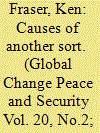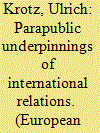| Srl | Item |
| 1 |
ID:
082673


|
|
|
|
|
| Publication |
2008.
|
| Summary/Abstract |
The Islamic caliphate is a key competitor in the global ideological marketplace. Indeed, it has been called 'one possible configuration for a post-industrial politics' (Philip W. Sutton and Stephen Vertigans, 'Islamic "New Social Movements"?: Radical Islam, Al-Qa'ida and Social Movement Theory', Mobilization 11, no. 1(2006): 105). What is its nature? The answer illustrates the argument that the relationship between the informal conception of collective identity and its non-agentive interest in formal establishment is the ontological basis of international relations. This points the way toward resolution of the agent-structure problem with reference to evolutionary theory. Distinguishing between action and behaviour on the basis of subjecthood is useful, showing that actors' primary interest is self-identification through affirmation of an institutional ideal-state. Such ideational objects do not act, but those through which agents successfully constitute and affirm themselves are more likely to prosper strategically. The caliphate is one such. Thus, conceptions of collective identity behave, compete and evolve.
|
|
|
|
|
|
|
|
|
|
|
|
|
|
|
|
| 2 |
ID:
079485


|
|
|
|
|
| Publication |
2007.
|
| Summary/Abstract |
Parapublic underpinnings of international relations are cross-border interactions that belong neither to the public world of states nor to the private world of societies. They underpin relations among specific states and construct social purpose in the international realm. Focusing on Franco-German parapublic underpinnings reveals a particular and neglected kind of `Europeanization'. Such parapublic activity includes massive state-financed youth exchanges, some two thousand municipal partnerships, and a host of institutes and associations. In their entirety, these parapublic interactions have developed into structural components of the European polity. Rather than directly affecting domestic political affairs, this kind of Europeanization connects French and Germans in a certain way. It makes Europeans more European, but without making them less national. This article contributes a concept to properly capture a distinct and substantial type of international activity and to identify its characteristic effects and limitations
|
|
|
|
|
|
|
|
|
|
|
|
|
|
|
|